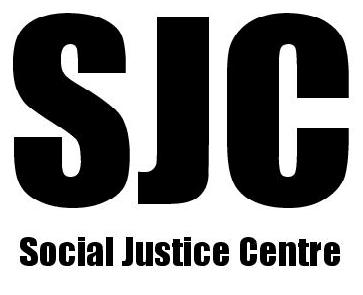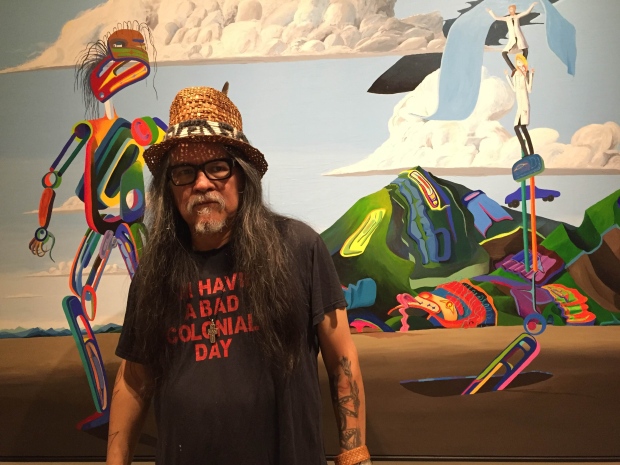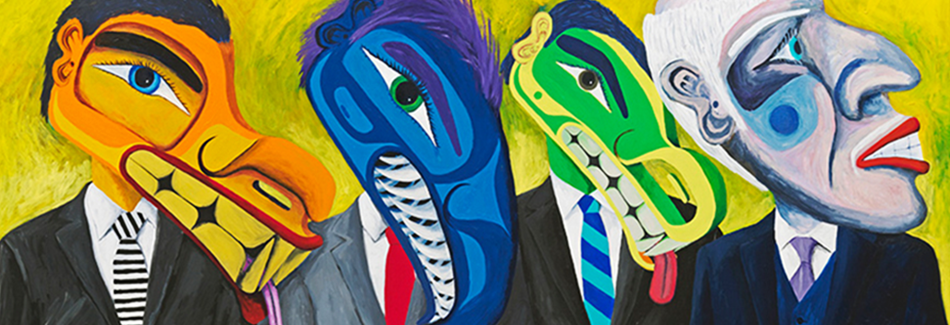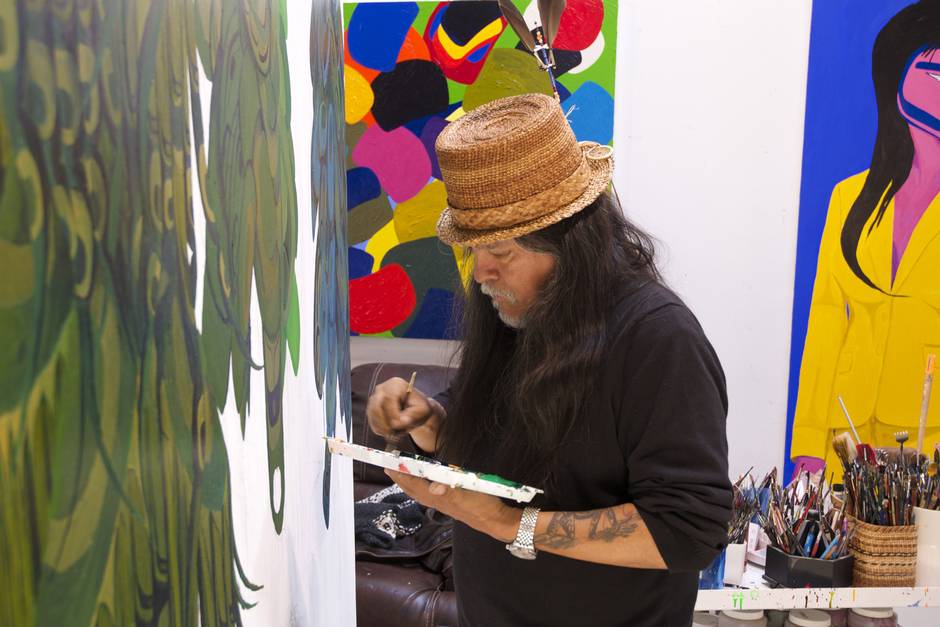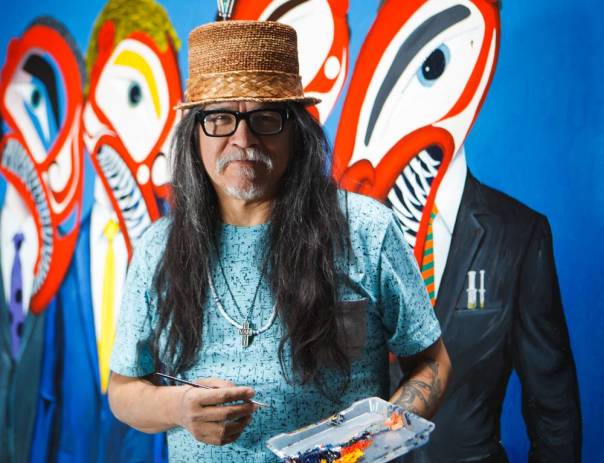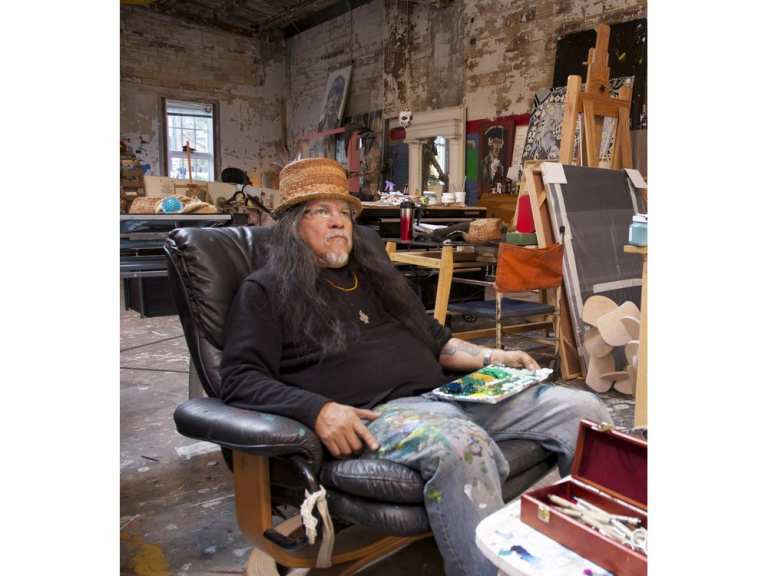Hosted by the SFU Institute for the Humanities
Report by Jeff Shantz, Social Justice Centre, KPU
On Friday, November 10, 6:00PM–8:00PM, at SFU Harbour Centre, I attended a forceful and challenging presentation by Salish and Okanagan artist Lawrence Paul Yuxweluptun. He wasted no time in engaging his audience, which seemed largely composed of settler art students.
Yuxweluptun by stating that Guantanamo Bay already exists in Canada—in reserves. He continued that that is how Indigenous people view them—as colonial confrontation camps.
He also stated that he does not know what freedom means and he cannot go back far enough in his community history to ask an ancestor who knows what freedom means.
On the eve of Remembrance Day Yuxweluptun noted that more children aged 4-19 were killed in residential schools than Indigenous fighters in both world wars. He suggested that for Indigenous people their veterans include children who survived a war being waged against them
He asked his grandma what the worst thing about residential schools was. Her answer was dentist day. Then, when they ran out of anaesthetic they tied children to the chair and drilled their teeth anyway.
He said that his father was not legally allowed to go past grade 12. His dad got scurvy at residential school. They tied him to a chair, put his head in a brace and pulled all his teeth out. Every move at the school was regimented and regulated. He went from residential school to public school and it was going from one segregation to another.
Later in his talk Yuxweluptun would focus on the Indian Act which he identifies as the ongoing problem today. This is explicitly white supremacist legislation. He noted that as a person he is a ward of the Crown. In striking terms he noted that Indigenous people are under house arrest forever. Indigenous people are exiled on their own lands. They are “at home” but do not feel like being at home.
This makes Indigenous people and setters enemies. He then asked: “Are we still at war?” Then asked if he was a threat to settlers and their agenda.
He stated that Indigenous youth are being marched to prison. Yet most do not finish grade 12. He then suggested that the government will have to build more prisons if that is their continued practice around schooling.
In his words it is a system of fascism. Settlers do not see him as a human being. Indigenous people are left to suffer what he calls colonizational stress disorder.
It is a usufructory relationship. Usufruct—they take it, use it, and benefit from it. The province and corporations have made billions of dollars from unceded Indigenous lands. They could give one million dollars to every Indigenous person right now. The question is when are they going to give it back. If Canada does not want Indigenous people, it can let them leave—settlers can have the cities and Indigenous communities will take it from there he suggested tongue in cheek.
Every tree cut down in Indigenous territory is subsidized. It has been stolen. It has never been paid for. Every company in British Columbia has been given a free ride. Forestry has massively damaged the salmon populations. There is very little old growth forest left. Kill the salmon, starve the Indian. Yuxweluptun asked his audience to consider that if it only took 500 years to 500 million salmon, how long will it take to kill off the last one million left? The salmon are health care. People protecting the salmon and the waters are protecting their health care.
Yuxweluptun argued that we do not need the Kinder Morgan pipeline. And we do not need dams in British Columbia anymore. When damage occurs, shareholders sell off.
He identified ongoing problems with forestry management. He noted that many settlers resent Indigenous hunters hunting year round. So British Columbia settlers were given hunting licenses without regard.
In identifying the need for direct action and a new economy Yuxweluptun reflected that there could be a shutting down of highways and infrastructure until there is a redistribution and a move to a sharing economy. If not—roadblock it all. In his view we need to teach people to take care of a 100 mile radius of themselves. And he called on the audience to “take care of a 100 mile radius of yourself.”
Yuxweluptun identified ongoing white supremacy through the RCMP, the Department of Fisheries and Oceans, forest management, and park rangers. In his opinion the Salish design on Vancouver Police Department cars is racial profiling given how police target his people.
Yuxweluptun continued that not all Indigenous people want to settle land claims. Why would they sell it to settlers? Under comprehensive land claims they would extinguish their rights. They do not want to and why should they trust settlers? He notes that they cannot even get a moratorium on logging trucks in British Columbia. There is, he said, a movement among Natives to not settle land claims but did not discuss debates and viewpoints.
People do not want to settle land claims when they are still waiting for back rent over hundreds of years. Yuxweluptun joked that if forced to settle land claims he will bring in the biggest grizzly bear he can find and say—“make him sign it.” He will only sign it after the bear does. He continued that there is not enough money to settle land claims.
Reserves are being contaminated. They are being outgrown in population size. Reserves are too contained. There is not enough land for the population. Indigenous communities are the fastest growing groups in the Canadian state context. If government is not willing to end the reserve system then, he suggested, blockade all the roads.
Yuxweluptun noted that because he is not part of the formal “Native” organizations he does not have to shut up. As an artist his role is to be free. He stressed that while he is Salish and Okanagan, he is only able to register under one under the Indian Act.
Wrapping in up Yuxweluptun referenced renaming campaigns to remove area and street names away from corrupt industrial leaders and land controllers. He ended again with a call for the elimination of the Indian Act.
